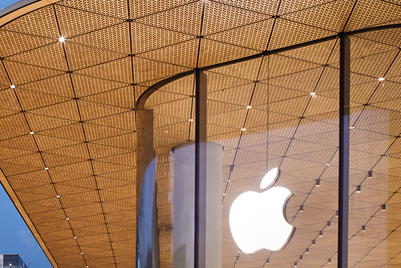+(900+x+600+px)+(2).jpg&h=570&w=855&q=100&v=20250320&c=1)
Global consultancy Kantar has released its annual BrandZ rankings, spotlighting the world’s most valuable brands. The report evaluates both the financial performance of companies and consumer perceptions across more than 50 countries. This year, the combined value of the top 100 global brands soared to $10.7 trillion—a significant 29% increase compared to last year.
Apple continues to dominate, holding the number one spot for the fourth consecutive year with a brand value of $1.3 trillion, up 28% from 2024. As the only trillion-dollar brand on the list, Apple alone accounts for over 12% of the total value of the Global Top 100.
US brands now represent a staggering 82% of the total value, up from 63% previously, to occupy the entire top 10. Tech giant Google ranks second with a brand value of $944 billion, marking a 25% growth year-on-year.
Rounding out the top 10 are Microsoft, Amazon, Nvidia, Facebook, Instagram, McDonald’s, Oracle, and Visa. Nvidia stands out with the most significant year-on-year increase for the second consecutive year, surging 152% to break into the top five for the first time. Known primarily as a hardware leader driving the crypto and generative AI revolutions, Nvidia also plays a vital role across automotive, gaming, and medical sectors as it produces new chips and platforms to support its clientele.

Amazon’s brand value has jumped 50% to $866 billion, buoyed by its strong reputation for convenience and affordability, which has helped it thrive amid economic challenges. Social media platforms Instagram and TikTok have also posted impressive growth of 101% and 25%, respectively, underscoring the ongoing influence of social media in shaping consumer behavior and powering direct-to-consumer ecommerce worldwide.
ChatGPT debuts at 60th place, marking the highest newcomer since Nvidia’s entry in 2021. However, it faces potential competition as established players like Google and Microsoft respond to its early lead in generative AI.
Chinese brands gain ground
While US brands dominate the top 100, Chinese brands are rapidly gaining ground, though escalating tariffs and market volatility could disrupt this trend. Over the past two decades, Chinese brands have doubled their total value and now make up 6% of the Global Top 100, a shift that has come largely at the expense of European brands, which now account for just 7%, down from 26% in 2006.
Tencent leads the Chinese contingent, narrowly missing the top 10 at 11th place with a brand value of $174 billion. Alibaba follows at 29th with $81 billion. In total, 12 Chinese brands feature in the top 100. TikTok ranks 30th with a value of $76 billion but still trails behind social media giants Facebook (6th), Instagram (7th), and YouTube (26th).
Among notable re-entrants is Chinese services platform Meituan at 80th place. Despite fierce competition in food delivery during the pandemic, Meituan has rebounded strongly, reclaiming dominance in China and expanding into new sectors like grocery retail and AI, as well as pursuing international growth.

Other returning brands include Morgan Stanley and Adidas, alongside two more Chinese companies: Agricultural Bank of China and consumer tech firm Xiaomi, which is now also competing in the automotive sector.
From the broader APAC region, four Indian companies make the top 100: Tata Consultancy Services ranks 45th with a brand value of $57.3 billion; HDFC Bank at $44.9 billion; Airtel at $37 billion; and Infosys at $33 billion. Notably, Airtel is the fastest-growing telco brand globally.
“Encouragingly, we’re seeing a growing number of brands from APAC securing positions among the world’s most valuable, underscoring the ambition, resilience, and global competitiveness of leading businesses across the region,” said Cheong Tai Leung, CEO of Kantar’s APAC insights division.
Disruption creates the most value
Brands that have disrupted their categories or reinvented themselves account for nearly three-quarters (71%) of the $9.3 trillion in incremental value created by the Global Top 100 since 2006. This year’s newcomers include Stripe and Chipotle, debuting at 85th and 86th place respectively, alongside Aldi, which has been a consistent presence for 15 of the past 20 years and currently ranks 94th.
“Innovators who keep pace with, or redefine, consumer needs are fundamentally reshaping the Global Top 100—think Uber, Booking.com, and now ChatGPT,” said Martin Guerrieria, head of Kantar BrandZ. “The most successful brands—Apple, Amazon, Google, and Microsoft—have long evolved beyond their original product bases.”
Elsewhere, Sweden’s Spotify re-enters the top 100 at 76th place; India’s Airtel shines as the fastest-growing telecom brand; Argentinian retailer Mercado Libre remains the only Latin American brand in the top 100; Spanish retailer Zara climbs five spots to 65th; and Canada’s RBC posts the highest year-on-year brand value growth (43%) among financial services brands outside the US.

Retail soars while luxury softens
By category, retail continues its post-pandemic momentum, with brand value rising 48%, driven by ecommerce and private label offerings that appeal to consumers amid inflation. In contrast, consumer categories like apparel (0%), food & beverages (-1%), and personal care (-5%) remain flat or decline, though brands such as Uniqlo, Coca-Cola, and Dove outperform their peers.
The luxury sector, one of the few to grow during the pandemic, has dipped 2% in 2025, partly due to softer demand in China, where shifting consumer preferences favour lifestyle experiences over displays of wealth.
“In a world saturated with digital options and high consumer expectations, brands must meet real needs, connect emotionally, and offer something genuinely unique to succeed,” Guerrieria added. “The enduring dominance of brands like Apple, Instagram, and McDonald’s highlights the power of a consistent, relatable brand experience. ChatGPT’s rapid rise demonstrates how a brand can achieve fame and influence society profoundly, but with generative AI competition intensifying, OpenAI must invest heavily in its brand to maintain its first-mover advantage.”


.jpg&h=334&w=500&q=100&v=20250320&c=1)


.png&h=334&w=500&q=100&v=20250320&c=1)

.jpg&h=334&w=500&q=100&v=20250320&c=1)
.png&h=334&w=500&q=100&v=20250320&c=1)
.png&h=334&w=500&q=100&v=20250320&c=1)

.png&h=334&w=500&q=100&v=20250320&c=1)
.png&h=268&w=401&q=100&v=20250320&c=1)




.png&h=268&w=401&q=100&v=20250320&c=1)

